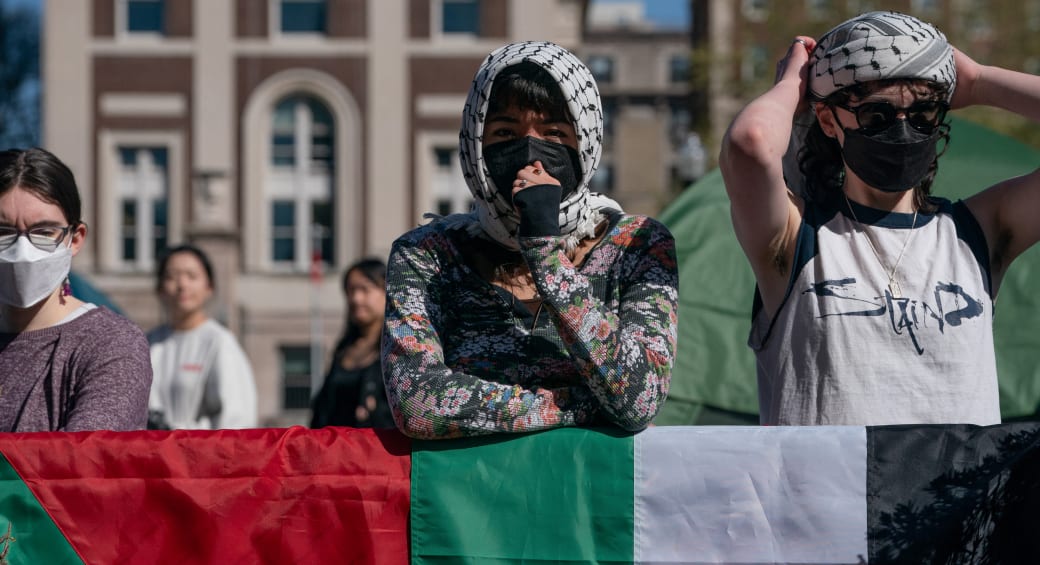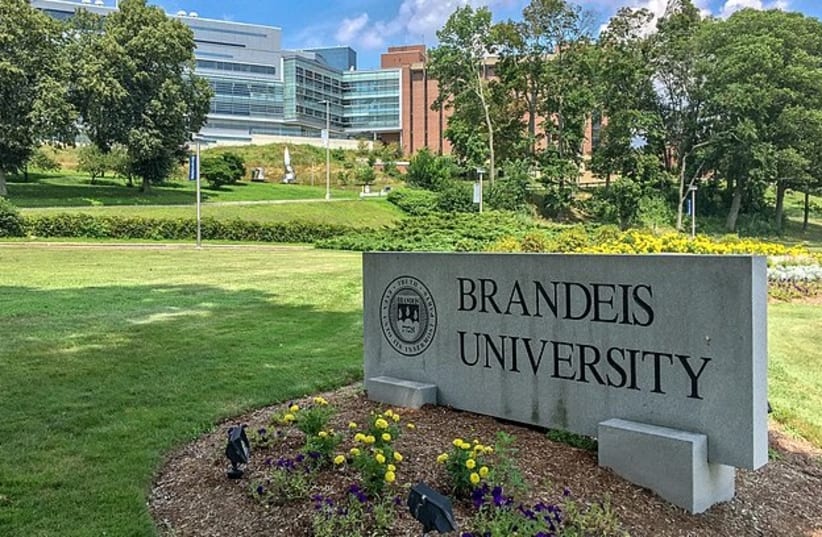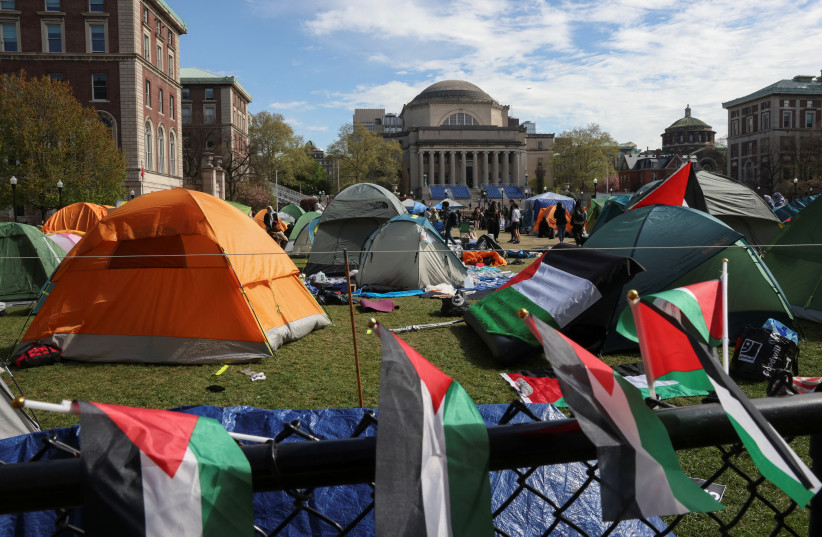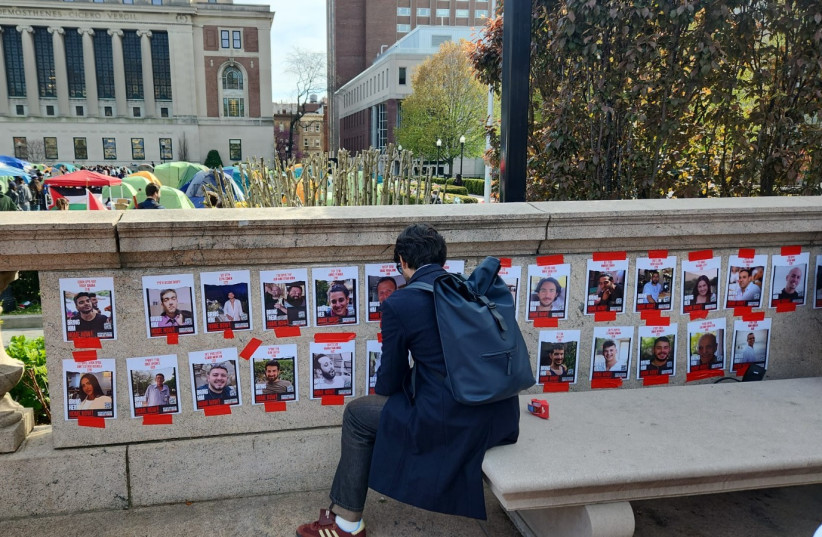American universities: dueling lawsuits claim Title VI violations at Columbia
Encampments have spread to dozens of campuses across the US.

Brandeis extends transfer deadline for Jewish students distressed by anti-Israel protests
“Due to the current climate on many campuses around the world, we are now expanding the opportunity for students to seek the learning environment of our campus by extending the transfer application."

Brandeis University, the historically Jewish school outside Boston, has extended its transfer application deadline in a bid to appeal to students who are unhappy with their own schools’ responses to campus anti-Israel protests.
The university announced the decision on Monday as encampment protests spread from Columbia University to campuses across the United States.
The protests, which take aim at the schools’ ties to Israel, are spurred by the Israel-Hamas war in Gaza and have, in some places, included rhetoric that veers into antisemitism. Jewish groups and some Jewish students say the protests have left Jewish and pro-Israel students unsafe and unable to take part in campus activities.
Jewish students feel unsafe on campus due to protests and look to transfer
“As a university founded in 1948 by the American Jewish community to counter antisemitism and quotas on Jewish enrollment in higher education, Brandeis has been committed to protecting the safety of all its students, and, in the current atmosphere, we are proud of the supports we have in place to allow Jewish students to thrive,” Brandeis President Ron Liebowitz wrote in an email to the community. “Due to the current climate on many campuses around the world, we are now expanding the opportunity for students to seek the learning environment of our campus by extending the transfer application deadline to May 31.”
Brandeis made headlines shortly after Hamas’ October 7 attack on Israel, which killed 1,200 people and triggered the war when a portion of its student government failed to pass a resolution condemning Hamas.
 Students continue to maintain a protest encampment in support of Palestinians on the Columbia University campus, during the ongoing conflict between Israel and the Palestinian Islamist group Hamas, in New York City, U.S., April 24, 2024 (credit: REUTERS/CAITLIN OCHS)
Students continue to maintain a protest encampment in support of Palestinians on the Columbia University campus, during the ongoing conflict between Israel and the Palestinian Islamist group Hamas, in New York City, U.S., April 24, 2024 (credit: REUTERS/CAITLIN OCHS)But the broader student government soon reversed course, and in November, the school became the first to ban its chapter of Students for Justice in Palestine, saying that the group “openly supports Hamas” — a departure from other schools that have since suspended the group for technical offenses against protest policies.
About a third of students at Brandeis, which is nonsectarian, identify as Jewish, according to Hillel International.
“Students elsewhere should know we welcome all — Jews and students from every background — who seek an excellent undergraduate education and an environment striving to be free of harassment and Jew-hatred to apply,” Liebowitz wrote.
Go to the full article >>Thousands at Columbia sign letter calling for enforcement of school policy
The letter is not affiliated with the university's Antisemitism Task Force.

Over 4,360 Jewish faculty, staff, students, alumni, parents and community members signed a letter this week to Columbia University President Minouche Shafik, the Board of Trustees and deans of all Columbia schools calling for adherence to university and federal education civil rights policies.
As the Gaza solidarity encampment remains on campus and hundreds of protestors both affiliated and non-affiliated with the university have descended upon the school for almost its second week, Jews associated with the university are asking for enhanced security measures, protection of academic activities and for increased community relations with the surrounding neighborhood.
The undersigned said they wrote to offer their support and partnership to "secure safety, speech and civility" on campus.
"We imagine that the decision to request help from the NYPD to address the unauthorized student encampment on our campus must have been difficult, especially in light of Columbia’s campus history," the letter said.
The undersigned added they are highlighting the administration's duties to enforce the rules of the university such as the "Charters and Statues of Columbia University" which outlines the president's responsibility to end demonstrations that pose a "clear and present danger" to persons, property of the substantial functioning of any division of the University.
 Protests at Columbia University, April 24, 2024. (credit: Omer Lubaton Granot)
Protests at Columbia University, April 24, 2024. (credit: Omer Lubaton Granot)The undersigned said the faculty and student campus groups supporting the encampment do not represent the majority of students who they said presumably want to peacefully student, teach, research, live and work on campus.
"These activities are impeded given the repeated and flagrant violations of University rules," the letter said. "This is especially concerning as students enter the final exam period and upcoming commencements. We also explicitly recognize the rights of our neighbors and the surrounding community."
The letter further outlined examples concerning antisemitic and anti-Israel language used by protestors.
Also in the letter is a reminder of the US Department of Education's Office of Civil Rights "Dear Colleague" letter on "Shared Ancestry" which reminded "colleges, universities and schools that receive federal financial assistance of their legal responsibility title VI of the Civil Rights Act of 1964 and its implementing regulations (Title VI) to provide all students a school environment free from discrimination based on race, color, or national origin, including shared ancestry or ethnic characteristics.”
Professors involved in the encampment as well
The letter also criticized professors who held classes, office hours and meetings from inside the encampment where student protestors denied entrance to anyone who is identified as a Zionist.
Pictures shared by at least two different social media accounts associated with groups involved in the encampment showed professors holding class within the encampment.
An Instagram account called the Teachers College Abolition Coalition shared multiple photos of Dr. Sandra Schmidt, the Program Director for social studies education, holding class on Wednesday within the encampment.
Schmidt has not responded to The Post's request for comment about her decision to hold class in the encampment.
The Post has also reached out to the university for comment on this and has yet to receive a response.
"The situation on campus continues to escalate. There are reports of death threats, calls for violence, physical assault of students and stealing of their property, explicit support of terrorist organizations, and calls for ethnic cleansing," the letter said. "These invocations have occurred with frequency both within and beyond the campus walls."
"All we want to do is educate ourselves"
On Wednesday, the Post spoke with two Israeli students on campus who signed the letter.
Third year financial economics and neuroscience student Itay and and third year economics and political science student Noy were sitting on a bench in front of a wall covered in posters of the hostages that overlooks the Gaza encampment.
Itay said the Jewish community had to come together, like how on Hanukkah the individual lights together make a big fire.
It doesn't matter if one person sends her an email, Itay said, we have to come together as one.
"And at the end of the day, all we want to do is educate ourselves. We came here to receive a proper education, which we cannot receive right now," Noy said. "We're limited in our ability to even navigate on campus. So being able to show our appreciation for even a little bit of support is something that was very important to us."
Wednesday was the first time Noy came back to campus since the protests escalated last week. She said she felt too unsafe and scared to come on campus.
Dr. Gil Zussman, who is Israeli and received three degrees from the Technion-Israel Institute of Technology, is the Vice Chair in the Electrical Engineering department and also signed the letter.
In December, Zussman was appointed to the Antisemitism Task Force.
"We encourage the university to keep enforcing its own rules. We're not calling for inventing new rules or anything else," Zussman said. "Just keep enforcing your own rules in order to bring the place to order and not allow a very vocal, small minority of faculty and students to hijack the situation. So that's the objective I would say of sending out this letter."
The letter is not affiliated with the Antisemitism Task Force.
Zussman told the Post the letter is asking the administration to go back to focusing on what the university needs to do, which is teaching, research and patient care. The university needs to graduate the seniors and the encampment is intentionally blocking the location of commencement.
Zussman said there is a broad misunderstanding of Title VI and students and faculty don't understand that certain speech permissible in protests off of school grounds is not permitted on campus. Zussman said there is also a double standard applied to Jews and Israelis that would not be tolerated against other protected groups.
"We know this has been an incredibly difficult time for so many in our community, especially Jewish/Israeli and Muslim/Palestinian students, faculty, and staff. There is much work that needs to be done to bring us together and to restore Columbia’s reputation as an exemplar of reason, inclusion, learning, and discovery," the letter said.
The letter concluded, "we stand ready to work with you to help make Columbia the inclusive and safe campus it strives to be, and a place where all students, faculty and staff can flourish."
Go to the full article >>Yeshiva University re-opens admissions amid safety concerns at other campuses

Yeshiva University, the flagship Modern Orthodox institution in New York City, has re-opened its admissions process as pro-Palestinian encampments, many of them explicitly pro-Hamas, have raised safety concerns for Jewish and Israeli students.
The school will reopen its portal for undergraduate applicants, Berman said, and he has reserved places in a special track to pursue an undergraduate degree through some courses in Israel and others in the United States.
"We have also heard from top-tier faculty across the country who are feeling uncomfortable on their current campuses and are interested in being part of an institution whose core values align with our own," Berman added. "As we continue to expand, we are creating new faculty positions in a number of fields."
Go to the full article >>Campus protests in second week
Students at universities across the United States have set up protest encampments on school grounds, proclaiming solidarity with Palestinians in Gaza and demanding that schools sever their relationships with Israel.
The protests began at Columbia University, where police arrested more than 100 students before the encampment immediately reconstituted itself last week. The encampments, which now number in the dozens, have been the site of hundreds of arrests.
The demonstrations include calls for "intifada" against Israel, open expressions of support for Hamas, and praise for the October 7 attacks. The radical rhetoric has drawn wide condemnation, including from the White House and the leadership of Israel.
At Columbia, a campus rabbi advised Jewish students to leave campus for their own safety, and several historically Jewish schools have re-opened their admissions process to accept students concerned for their wellbeing.
Many left-wing voices and progressive congresspeople praise the demonstrations, insisting that they are nonviolent and calling for peace.